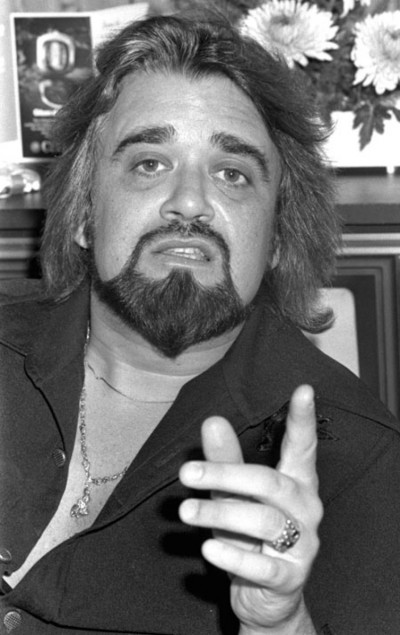Wolfman Jack (Robert Weston Smith)

Wolfman Jack
Wolfman Jack, the rock-and-roll disk jockey whose unmistakable raspy voice and on-the-air howls brought him something of a cult following as one of America’s best-known radio personalities, died yesterday at his home in Belvidere, N.C. He was 57.
The cause was a heart attack, said his daughter, Joy Renee Smith.
He was a radio-show host right up until his death, broadcasting his last “oldies but goodies” show Friday night from a Planet Hollywood restaurant in Washington, D.C. Just before his death he returned home from a 20-day tour to promote his autobiography, “Have Mercy: Confessions of the Original Rock-and-Roll Animal,” published by Warner Books.
He was born Robert Smith in Brooklyn on Jan. 21, 1938, and for a couple of years in 1960 and 1961 he was Daddy Jules on WTID in Norfolk, Va.
But he cascaded to fame as Wolfman Jack, a faceless hero on the AM airwaves and a pioneer of the peculiar genre called border radio, because it was broadcast from just over the border in Mexico. He was among a group of border disk jockeys in the early 1960’s with names like Hound Dog and Huggy Boy, and he had his name legally changed.
From 1963 to 1966, Wolfman Jack howled and growled at night on XERF-AM in Via Cuna Cohuilla, Mexico. In 1966 he moved to XERB, where he spun the latest rock tunes from a small studio in the sleepy resort town of Rosarito, overlooking the Pacific Ocean, 15 miles south of the United States border. The station pumped out at 250,000 watts, five times the legal limit for American stations at the time, and was heard across most of the country.
In the studio, he was every bit as crazy as he sounded, with his face contorting, his eyes bulging and his hands waving wildly. And he had a habit of issuing outrageous orders, like “Get naked!” to his listeners.
It was not until he played himself in the 1973 film “American Graffiti” that fans could match the voice with a face. And they were not disappointed. The Wolfman looked the part, with bushy eyebrows, sideburns, a mustache and a devil’s goatee.
In 1962 he worked at KCIJ, a country station in Shreveport, La., where he went by the name Big Smith With the Records. Byron Laursen, a New Jersey writer and co-author of Wolfman Jack’s autobiography, said that Wolfman Jack also worked in an interracial nightclub called The Tub, which was housed in an old Quonset hut, and served as host of a weekly interracial dance party for teen-agers.
Twice Wolfman Jack had crosses burned outside his home by members of the Ku Klux Klan angered by the interracial activity, Mr. Laursen said. “He was instrumental in getting some great music on the airwaves, especially black music, that wasn’t getting a lot of exposure,” Mr. Laursen said.
He moved to New York and for about a year worked for WNBC radio. In 1974 he moved to Los Angeles, where he had his own syndicated radio show, heard on nearly 2,000 stations worldwide, as well as “Midnight Special,” an NBC television show.
In recent years, he made about 150 appearances a year, serving as host at a variety of events, said Lonnie Napier, Wolfman Jack’s manager and the vice president of Wolfman Jack Entertainment. The Friday night radio show he worked on until his death was carried on 55 stations across the country, Mr. Napier said.
Wolfman Jack also became famous for his appearances in television commercials, especially extended “infomercials,” in which he hawked rock-and-roll music collections. He moved to Belvidere six years ago to be with his wife’s family. In addition to his daughter, he is survived by his wife, Lou Lamb Smith of Belvidere, whom he often referred to on the air as “Wolfwoman”; a son, Todd Weston Smith, and a granddaughter.
Born
- January, 21, 1938
- Brooklyn, New York
Died
- July, 01, 1995
- Belvidere, North Carolina
Cause of Death
- heart attack
Cemetery
- Smith Family Estate Cemetery
- Belvidere, North Carolina



